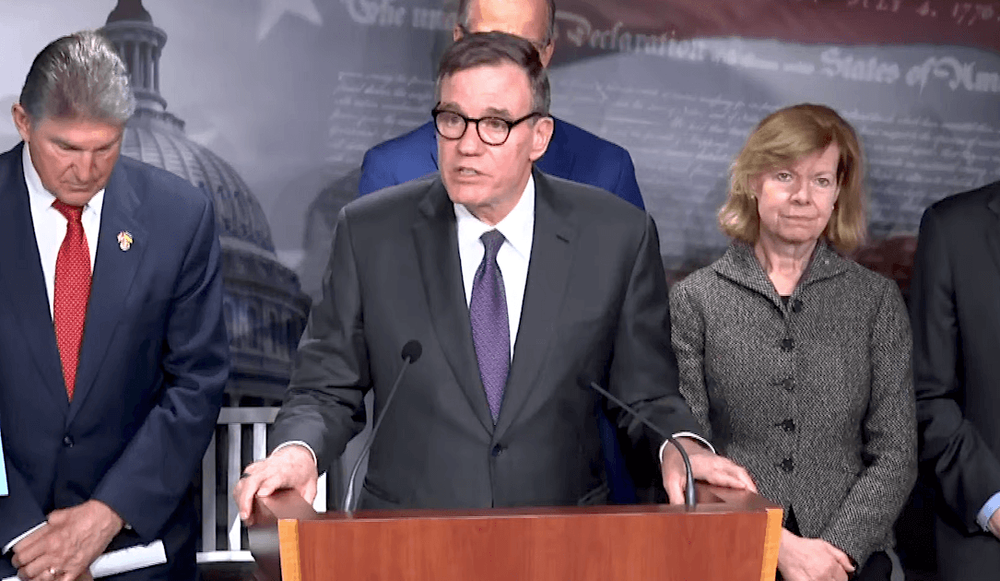Bipartisan Senate bill would allow for US ban of TikTok
Twelve U.S. senators introduced bipartisan legislation Tuesday that would give the Commerce Department the ability to ban technology that is deemed a risk to national security.
The Restricting the Emergence of Security Threats that Risk Information and Communications Technology (RESTRICT) Act was devised as a legal apparatus to facilitate the banning of TikTok, one of the biggest social media platforms in the world and one used by more than 100 million U.S. residents.
The app is owned and run by ByteDance, a Chinese company that has faced backlash for several privacy-related controversies in recent years, including the revelation in December that employees inappropriately obtained the data of U.S. TikTok users.
The bill’s chief sponsor, Sen. Mark Warner (D-Va), argued that it was necessary to combat potential legal challenges to an outright ban of the app by any arm of the U.S. government. He called it a “rules-based” approach, noting that the legislation would apply not only tech from China, but also from adversaries such as Russia, Iran and North Korea.
“We need a comprehensive, risk-based approach that proactively tackles sources of potentially dangerous technology before they gain a foothold in America, so we aren’t playing Whac-A-Mole and scrambling to catch up once they’re already ubiquitous,” said Warner, who is chairman of the chamber’s Intelligence Committee.
During a press conference, Warner compared TikTok to other Chinese technology giants like Huawei and ZTE as well as Russia’s Kaspersky Lab. All three are on a U.S. government list of companies that present “unacceptable risk” to U.S. national security.
On Tuesday U.S. National Security Agency Director Paul Nakasone testified that he and others are concerned about not only the data from U.S. citizens collected by ByteDance but also its potential use for influence operations. The app Americans see is also vastly different from the one allowed in China.
In a statement to The Record, TikTok spokeswoman Brooke Oberwetter referenced the long-running negotiations between the U.S. Commerce Department and TikTok, arguing that the RESTRICT Act was unnecessary because the White House can simply approve the deal that was negotiated over two years “that it has spent the last six months reviewing."
"We appreciate that some members of Congress remain willing to explore options for addressing national security concerns that don't have the effect of censoring millions of Americans,” Oberwetter said. “A U.S. ban on TikTok is a ban on the export of American culture and values to the billion-plus people who use our service worldwide."
‘Systematic framework’
On behalf of the White House, national security adviser Jake Sullivan released a statement backing the legislation, saying it would “address the threats we face today, and also prevent such risks from arising in the future.”
“This bill presents a systematic framework for addressing technology-based threats to the security and safety of Americans,” Sullivan said. “This legislation would provide the U.S. government with new mechanisms to mitigate the national security risks posed by high-risk technology businesses operating in the United States.”
FBI Director Christopher A. Wray previously listed a range of concerns about the popular app, including the possibility that it could be used by the Chinese government to control data collection on millions of users or control the recommendation algorithm.
He also warned Congress that it could be used for influence operations or “to control software on millions of devices which gives the opportunity to potentially technically compromise personal devices.”
In addition to Warner and John Thune (R-SD), the bill is backed by Sens. Tammy Baldwin (D-WI), Deb Fischer (R-NE), Joe Manchin (D-WV), Jerry Moran (R-KS), Michael Bennet (D-CO), Dan Sullivan (R-AK), Kirsten Gillibrand (D-NY), Susan Collins (R-ME), Martin Heinrich (D-NM), and Mitt Romney (R-UT).
The bill requires the Secretary of Commerce to establish procedures to examine transactions involving information and communications technology products in which any country deemed a “foreign adversary” has any interest and poses undue or unacceptable risk to national security.
It would focus on communications and technology products used in critical infrastructure.
Several senators said the bill was a step toward a much larger privacy bill — something Congress has failed to get passed for multiple years.
Baldwin said the bill would “empower us to respond to our fast-changing environment.”
“While many of these foreign-owned technology products and social media platforms like TikTok are extremely popular, we also know these products can pose a grave danger to … users and threaten our national security,” she said.
Dozens of states have already banned government officials from having the TikTok app on their phone. Warner noted that other countries like India and Canada have also instituted bans on TikTok due to its ties to the Chinese government.
Both the Defense Department and the House of Representatives recently banned the app as well. TikTok has spent months in negotiations with the Commerce Department on security and privacy measures that would attempt to stop ByteDance or the Chinese government from accessing U.S. user data.
But some experts have questioned whether this would even be feasible and noted that even China does not allow the U.S. version of the app to be used by Chinese citizens.
“The Chinese Communist Party is engaged in a multi-generational, multi-faceted, and systematic campaign to replace the United States as the world’s superpower,” said Sen. Romney, who later argued that concerns about U.S. government spying on citizens should instead be focused on China.
“Our adversaries—countries like China, Russia, Iran—are increasingly using technology products to spy on Americans and discover vulnerabilities in our communications infrastructure, which can then be exploited.”
Jonathan Greig
is a Breaking News Reporter at Recorded Future News. Jonathan has worked across the globe as a journalist since 2014. Before moving back to New York City, he worked for news outlets in South Africa, Jordan and Cambodia. He previously covered cybersecurity at ZDNet and TechRepublic.



